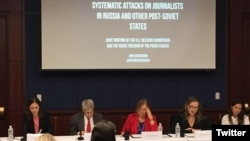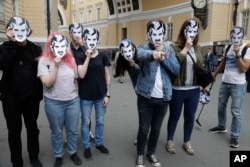As Moscow’s propaganda efforts targeting Americans are under scrutiny by Congress, some lawmakers are pushing for increased support for U.S. government-funded broadcasting in Russia.
Lawmakers issued the calls Wednesday during a meeting of the Helsinki Commission, an independent U.S. government agency that monitors democracy and human rights in Europe.
“A free press is now more important than ever, and absolutely necessary to counter an increasingly bold [Russian President] Vladimir Putin,” said Congressman Steve Chabot.
The hearing came hours after the Senate Intelligence Committee briefed the public on its ongoing investigation into attempted Russian meddling in the 2016 U.S. presidential election.
Committee leaders said they haven’t concluded whether there was collusion between Moscow and officials linked to President Donald Trump’s campaign.
Goal to ‘create chaos’
But the senators said there is a “consensus” among their members and staff that they trust the conclusions of the U.S. intelligence community that Russia sought to influence the 2016 vote.
“It seems the overall theme of the Russian involvement in the U.S. election was to create chaos at every level,” said Committee Chairman Richard Burr, a Republican.
U.S. officials believe Russia was behind the hacking of the Democratic National Committee and the email account of John Podesta, the campaign director of former presidential candidate Hillary Clinton.
They also say Russia exerted influence through state-funded media outlets, such as RT and Sputnik, and Russia-linked content on social media platforms such as Facebook and Twitter.
Putin ‘hell-bent’ on destroying media
In addition to his efforts to subvert U.S. democracy, Putin is also “hell-bent on destroying the independent press…because it is a threat to his rule,” said Congressman Chabot.
To help counter those efforts, Chabot and Congressman Adam Schiff told the Helsinki Commission that the Broadcasting Board of Governors (BBG), which oversees VOA and U.S. other international broadcasters, is essential.
“A strong, independent free press is a natural obstacle to Putin’s grand strategy. We must continue to support efforts by the BBG and VOA, the Voice of America, to provide a balanced and comprehensive platform in the region,” Chabot said.
Increased persecution
Journalists in Russia and other post-Soviet states face increasing violence and intimidation, panelists at the commission warned.
At least nine journalists have been killed in Russia over the past decade, according to the Committee to Protect Journalists (CPJ), which says nearly all the perpetrators have gone free.
Additionally, CPJ has documented at least 13 separate cases over the past eight months in which journalists in Russia have been threatened, physically attacked, or killed in apparent retaliation for their work.
Russia has also cracked down on Internet use. During the past year, Moscow has banned virtual private networks (VPNs) that allow users to access banned sites, as well as anonymous use of online messaging services.
Moscow ranks 148 out of 180 countries in press freedom, according to the latest annual ranking by Reporters Without Borders. Seven other post-Soviet states appeared in the bottom 20 percent of the rankings.
VOA Russian Service
“It is in this environment that we - the Voice of America - operate,” VOA Director Amanda Bennett said. “Our mandate from Congress is to bring America’s story to the world, explain U.S. policy, and foster responsible discussion with accurate, objective, and comprehensive journalism.”
VOA today broadcasts throughout Russia and post-Soviet states in six languages. Its Russian Service first went on the air in 1947.
“Threats and intimidation are not new for us, but in recent years, we have seen increased harassment by Russian authorities, unexplained bureaucratic delays, and increasingly negative public rhetoric about VOA’s journalism,” Bennett said.
But the problem isn’t unique to Russia, warns CPJ’s Nina Ognianova. She said “receding media freedom” throughout Europe and in the U.S. has “emboldened authoritarian governments” in Moscow and other post-Soviet states to “crack down on independent media.”











